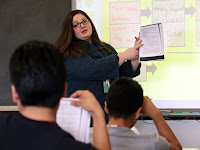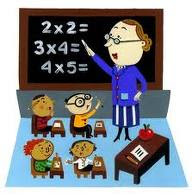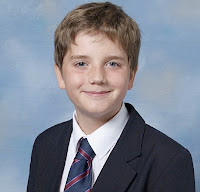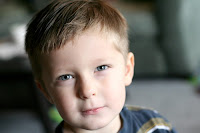First of all, I’m obviously NOT a doctor or a professional. I am simply the mother of a child, Ryan, with Aspergers who has done a ton of research, reading and have talked to several medical professionals about this condition. I am simply giving my opinion and the things I’ve learned about this condition during the last year.
I’m going to try and write as much of this editorial as possible from the knowledge I’ve personally obtained through research and reading rather than give you a ton of medical jargon. Aspergers is a pretty newly diagnosed condition with the first official diagnosis occurring in about 1995-1996. Prior to this condition’s discovery, most children and people with ASPERGERS were diagnosed as “Autistic”, “ADHD” or some other developmental condition.
There is a lot of debate among professionals as to whether or not ASPERGERS should be considered a “form of autism” or a totally separate condition. Either way, ASPERGERS at the current time is considered to be on the mild spectrum of “Autism” or “PDD’s” (Pervasive Developmental Disorders) and is a developmental delay that is rather similar in many aspects to the different forms of Autism.
My husband’s [John] job was the reason for our relocation over 2 years ago. At this time Ryan was not quite 2 years old. When we moved here to our new home, we didn’t know anyone in this area. Our family and friends were at least 4-5 hours away, and we were all alone. Soon enough, we began to make friends and socialize with some people in this area. We began to spend a lot of time with one of the couples we became close friends with almost immediately. This lady is a Speech and Language Pathologist/Therapist. Since Ryan was still pretty young, it was difficult to tell much about his language and speech abilities, but he was definitely “different”. After talking with this friend of mine, we pretty much chalked it up to all the ear infections he had as a baby and this was the reason his speech was a bit delayed. However, over the last 2 years, the delay became significant, and my friend recommended we bring him in to the Speech Center here in town for a free screening. We did just that, and from there it just snowballed.
Indeed, Ryan had significant (moderate to severe) delays in speech and language. He immediately began speech therapy twice a week. It was difficult for me to accept that Ryan needed speech therapy, but little did I know what was ahead. After a month or so of speech therapy, the therapist discussed with me that she felt there was “more going on than just speech delays” and that we should have him evaluated by a Psychologist. What? Now I was freaked out big time. But I knew she was right, so we did go ahead with the evaluation. Thank God for a wonderful Developmental Psychologist here in our area. She came highly recommended and now that I’ve met her, I know from experience that she is simply amazing. She didn’t make us subject Ryan to another doctor’s office, so she came to our home FOUR times before completing the evaluation.
The first session she mainly talked with John and me while she observed Ryan as he played and interacted with her. The next 3 sessions were geared towards testing and evaluating Ryan. She was wonderful with him and he really liked her being here. He thought they were just playing games, so the evaluation was very stress free. She also took the time to come to a therapy session to observe, and then to meet with Ryan’s Speech Therapist to discuss the therapist’s findings and viewpoints where he was concerned.
After the evaluations were completed, we received a “report” that gave us the official diagnosis. The Psychologist was very helpful and sincere in her diagnosis and did everything possible to make it easy on us. She made herself available to us at all times for questions and concerns that we wanted to discuss with her. She really was a godsend!
We Have A “Diagnosis”, Now What?
I was in shock. I absolutely couldn’t believe that something of this magnitude was wrong with MY child. Of course, the first feelings and thoughts I had were “WHY?” and then the guilt came. What did I do to cause this? Did I mess up during my pregnancy? Did I have more problems during my delivery than I realized? Did I give this to him somehow? WHAT did I do to cause this, because I know I’m the one at fault?
After the initial shock wore off, I began to read, read, read and read some more. Anything and everything I could get my hands on that had anything to do with Aspergers. I couldn’t GET enough information. Some of it was encouraging and some was very discouraging. Then I began to seek out other people in my position, parents of children with ASPERGERS. I wanted to talk to anyone and everyone I could find that had gone through this. I was fortunate enough to find several opinions members that knew all about this. The internet gives endless possibilities for people like me. I have met several parents over the last few months that I’m now in contact with and it has been very helpful. I also met a family in our church that has a son who is 6 and has autism. We have gotten together several times and let our children play. This has been wonderful all the way around. They were just as glad to meet US.
Now that I had lots of information and had talked to a few people in the same boat, I needed to know what to do next. With the direction of the Speech Therapist and the Psychologist, I was told what our options were. First thing was to get Ryan an appointment with a Pediatric Neurologist. This is to simply check him out and make sure he’s okay “physically”. This will also be the doctor we discuss our options regarding medications with.
Even though Ryan was only 3 when he was diagnosed, he now qualifies for several “services” in the school system in our county. Had we lived in the bordering state, we would not have these options. These options were only available to us because of the state and county we lived in. Coincidence? I think not. We were thanking God that we now lived on THIS side of the state line when at one time we DID live on the other side! I contacted the Preschool Director in our county, and they immediately set up a meeting and here we went. Ryan will now start Preschool full time and he’ll be in a “special needs” class with other developmentally delayed children, some of which have “autism”.
Other than this, he continues to go to speech therapy 1-2 times per week, and we work with him at home as much as we can. Now that we know how he operates and what he needs, we are better equipped to help him during the time we spend at home. I am a stay at home mom, so I am able to work with him a lot right now.
How The Diagnosis Changed Our Viewpoint & Our Strategy
Prior to getting the ASPERGERS diagnosis, we thought we had a “strong willed, hyper active, boy” on our hands. We knew he wasn’t “typical”, but we chalked it up to those things. Now that we had a REASON and a means to explain our child’s behavior, we could stop thinking we just had a “bad kid”. The diagnosis was a shock, don’t get me wrong, but we were almost relieved to know that there was indeed a reason for our child’s issues and behaviors. Immediately, things were put into perspective. We now knew the reason for all of his odd behaviors and why he did the things he did.
Our strategy of “we have got to make this kid behave” changed to, “we have to help him in every way we can”. It has not been easy, but we’ve made a lot of progress and conquered some difficult tasks over the last several months. Speech Therapy has been miraculous for him. We’ve seen things come about in him that we thought would take MUCH longer than it did. For this we are very thankful.
Our Experiences With An ASPERGERS Child
So how does he act? What are his problems? What makes him “different”? These are questions I hear a lot when someone wants to know more about Ryan and his ASPERGERS. A complete stranger doesn’t always notice that there is anything going on, but if you are around him for any length of time, you’ll probably notice it. ESPECIALLY if you are familiar with toddlers this age and the things they can do and their language abilities. If you have no experience with toddlers, you may not really notice that much of a difference in Ryan, but if you have been around toddlers at all, you will most likely see that he is different.
He knows no strangers. He will talk to anyone and everyone. You probably won’t understand what he’s saying, but he’ll chatter to you all day if you will listen. He does a lot of what is called “jargon”. Its speech, but it’s not understandable. Sometimes mom or dad can interpret, and sometimes we can’t. He doesn’t know how to have a “typical” or “normal” conversation. He only knows how to tell you what he knows. His latest is telling everyone we see that “We saw Jonah”, meaning the Veggie Tales Movie called “Jonah”. That was a big deal to him, and I made a point to “talk” to him about the events of that day, so now he tells everyone that we saw the movie. It’s one of the only lines he knows how to start a conversation with.
Up until 6 months ago, he couldn’t even answer simple yes/no questions. If you asked him a question that required a yes or no answer, he’d either scream and cry (meaning no) or grunt and point (meaning yes). Now, at least we had an idea of what his answer was, but we knew he needed to be able to say yes or no in response to questions. He can now do this in most instances, but we still have some issues with it from time to time.
When he talks to you, he may look your direction, but he makes very little direct eye contact. As a matter of fact, the therapist is working on this with him and it's been difficult. It's seemingly painful for him to have to make eye contact for longer than a second or two. He's working on it though. One way I've gotten him to look at my eyes for longer than a second is by asking him to tell me what color my eyes are. Works every time :)
He does a LOT of what is called “echolalia”. This is where the child repeats back to you what you have said to him. Ryan does this ALL the time. Why? This is how he responds to something that he doesn’t understand. If I ask him a question and he doesn’t understand what I’m saying, he’ll just repeat it back to me. OR, he’ll repeat it back to me until he grasps it, then he’ll answer me. It depends on his comprehension of the question. Sometimes he’ll eventually get it and answer me, and other times he’ll keep repeating it to the point of making himself upset. That’s when I have to re-phrase the question, or figure out a way to SHOW him what I mean with objects or pictures or by acting it out with another person.
He is just learning to tell us that he hurt his foot, arm, head, etc. He doesn’t know all body parts, but he’s getting there. If he got hurt while no one was in the room, we’d be left to guess where he was hurt. He would just cry. Now he can at least point and show us where he’s hurting. But, this is the extent of his being able to explain or tell us about pain. He’s had numerous stomach bugs, ear infections, sinus infections, and many other illnesses that we know causes pain or discomfort, but he has absolutely no idea how to tell us about a headache, earache or stomachache. Pain is a foreign concept to him except for telling us he bumped his head on the coffee table. Even though he's almost 4 years old, for us it's identical to dealing with a sick infant when it's time to take him to the dr. to figure out what's wrong.
He has what are called "food aversions". He is super, super, super picky about food, and there are certain food textures he will not put into his mouth. He doesn't eat any type of cut up meat. As a matter of fact, the ONLY meat he'll eat is a McDonald's cheeseburger. That's it. He absolutely will not eat any type of gummy or gooey candy (such as gummy bears or gumdrops). If he has to chew it longer than 5 seconds, it's going to get spit back out. Meal times are always challenging because there are only a handful of foods he'll eat without fighting us. But we do what we can.
He is a creature of habit and routine. He has been since the day he was born. He expects things to be the same as they were last time, and if there is change, there are consequences. This is one sure way to cause him to have a “meltdown” as I heard it adequately described by another parent. A few examples would probably be the easiest way to describe these situations. He has a routine throughout the day. He gets up, he eats breakfast, he plays and watches some TV, he eats lunch, he goes potty, he takes a nap, he gets up and gets a snack and some juice, he watches a movie, he plays, he eats supper, he puts on his pajamas, he brushes his teeth, he goes potty, he tells daddy goodnight, he sits with mommy in the rocking chair, we sing a song, we read a book and then he gets in bed. Granted, there are a few other things in there that are variables (such as going to a dr. appt., therapy, or the grocery store) but for the most part, this is his daily routine. If you even think about changing this schedule, you will regret it dearly.
When he gets up from his nap, you better have the cookies and juice waiting or else. If you forget to brush his teeth at bedtime, he’ll now tell you but before he could tell us, he’d just scream until we figured out that we had forgotten. Ask me if we ever forget anymore ;-) Routine is his safety net. If you change it, you totally rock his world.
Another routine example: He knows beyond a shadow of a doubt that on Thursdays (although he doesn’t understand days of the week) we go to Speech Therapy, and then we go to McDonald’s for a happy meal. And I mean THE same McDonald’s location too. He knows that we first place the order, and then we go to Window #1. He can count, so he knows the window #’s. He knows we pay at window #1. He knows we then drive up and get the food at window #2. That’s just the way it goes. A few weeks ago, we pulled up and that day no one was at window #1. I had to pull up to window #2 to pay AND to get the food. This blew his mind. I broke the routine and he couldn’t grasp or comprehend why. This type of thing literally causes him pain. He began to scream and have a major tantrum or meltdown. There was NO reasoning with him. He didn’t care that we DID get the food; he just kept screaming, “Go to #1”! The tantrum lasted for over 45 MINUTES! And this was a pretty mild one. There are endless examples, but you get the point.
He doesn’t understand sarcastic statements or tones. He takes everything literally. He doesn’t understand the concept of life and death, real and fantasy and many emotions or feelings. He’s almost 4 years old, but if you turned on a really scary horror film in front of him, he’d have absolutely no idea that it was supposed to be scary. He doesn’t understand “violence” and “language” on television. He just doesn’t grasp concepts like this. He is just learning to identify the difference between someone having a “happy” expression or a “sad” expression on their face. This has taken MONTHS for him to grasp.
He lives in a fantasy world most of the time. His favorite thing in the world is his movies and his toys. Even if he’s not watching television, he likes to listen to his movies while he plays. He memorizes EVERY single part of every movie he owns. He spends 80-90 % of his time re-enacting scenes from his videos and replaying them over and over. He even uses language and phrases from his videos in real life conversations with us and with other people. Sometimes he actually uses the phrases in context, but they are still not his original thoughts or expressions. Sometimes he’ll repeat a scene from a movie over and over and over until we literally stop him and literally make him snap out of the zone he’s in. We do this many times every day.
Now that we know things that will set him off, we can do our best to avoid them. However, there are some things we feel he has to learn to deal with. It depends on the situation. I know he wants his snack after naptime and that’s fine. I know he wants his happy meal on Thursday and that’s fine. I know he wants to sing and read a book at bedtime and that’s fine. But there are times when something upsets him when we feel it’s something he should be able to cope with so we do our best to calm him and make him okay in the situation. Sometimes it works, sometimes it doesn’t. There are times when we do have his snack ready after naptime but he’ll still begin to have a tantrum because the cookies are not in the same bowl or the juice is in a different cup. That’s when we feel he should be okay with it since the snack and juice are still there. We’ll reason with him that it’s the same thing, and if he won’t settle down, we make him go sit in his room and that is something that always allows him to calm himself down.
Depending on how upset he is, it could take anywhere from 1 minute to 10 minutes for him to calm down. This is a tactic that has been very effective for us (having him sit in his room quietly until he calms himself down). This method isn’t considered “time out” when it’s in this type of setting, although we do use “time out” as a means of discipline when he’s simply displaying bad behavior.
Basically, we’ve learned to live with and deal with the aspects of this condition. We aren’t pros, but we are learning day by day how to handle things better and how to help Ryan the best ways we can.
Any Upsides to All This?
Definitely. First of all, I don’t take my kid for granted anymore. I definitely realize that he could be in MUCH worse shape mentally and/or physically and I don’t take one second for granted anymore. I love this kid more than I ever did before, if that’s possible. All this really opened my eyes to parenthood. I have been given a responsibility, and I have to make sure my child gets the best that life has to offer. I am responsible for how well equipped he’ll be to deal with real life when he’s older. I know I can’t control things, but I have been given the duty to make sure he is given every opportunity to get better.
Even though I don’t wish this on anyone, and I still struggle with it myself on many days, I am so thankful that I now have an explanation for why Ryan is the way he is, and I now know what to do about it. Thanks to doctors, other parents and books/articles out there, I have a better grasp on this and how to deal with it. I’d rather know what the problem is and deal with it than to ignore it, live a lie and deprive Ryan of the help he deserves.
I now have the opportunity to help other parents out there who are struggling with this very issue. Since this is a fairly new disorder, there is limited information out there on ASPERGERS. I am now able to become a part of the information that is available by being able to share our experiences with others. I am an information fanatic. I always want to get my hands on books dealing with ASPERGERS, but nothing compares to talking with another parent of a child with ASPERGERS and what they have been through, what they have learned and what advice they can give to help me be a better parent to my child.
Ryan has“innocence” about him that I can’t really explain. He knows nothing about September 11th. Even if you told him, he wouldn’t understand. He knows nothing about the evil in our world. He knows nothing about the war, violence and terrorism out there. He has no concept of murder, death, rape, assault or any other violence that we see on the news every day. He knows when he’s a “bad boy” but that’s about the extent of what he knows is wrong in the world. I am almost comforted by the fact that he knows nothing about these things. But I know when he’s older it will be inevitable for him to learn and know about them.
He’s VERY smart. He has been able to count to 20 for quite some time (even earlier than most toddlers do); he knows all colors, shapes and the alphabet. Not only can he count to 20 and say the entire alphabet, he recognizes numbers and letters out even out of order. He knows every single movie and every book he owns by memory. He knows where they are, what they are and what they are about. Even from another room he can tell you every book he owns. He remembers EVERYTHING. We can take a road trip that is several hours long, and the second time we make the trip, he knows where we are and where we are going by the time we have gone 3-4 miles. We travel a LOT since we have no family or friends here locally, so he has memorized a LOT of routes and scenery.
He is also the most loving and affectionate child you can imagine! He loves to snuggle, hug and give lots of sugar. He is my heart!
In Conclusion
I know this has been rather lengthy, but I wanted to discuss as many aspects of ASPERGERS as I could, from a parent’s viewpoint. There are lots of medical things I could have included, but there are so many other resources for that type of information. I simply wanted to offer an inside perspective of this disorder and how we’ve dealt with it over the last year.
To any other parents out there who have a child with any type of developmental or psychological disorder or condition, I hope this has helped in some way and I’m ALWAYS available to talk via email to anyone who would like to email me.
Aspergers has definitely changed the lives of Ryan, John and I forever. We have a long journey ahead of us, but we intend on making it the easiest and most pleasant journey we can, especially for our adorable son who was given to us by God. Thanks to "Online Parent Support" and the
My Aspergers Child eBook, we are much much better off today and making continued progress - one day at a time.








